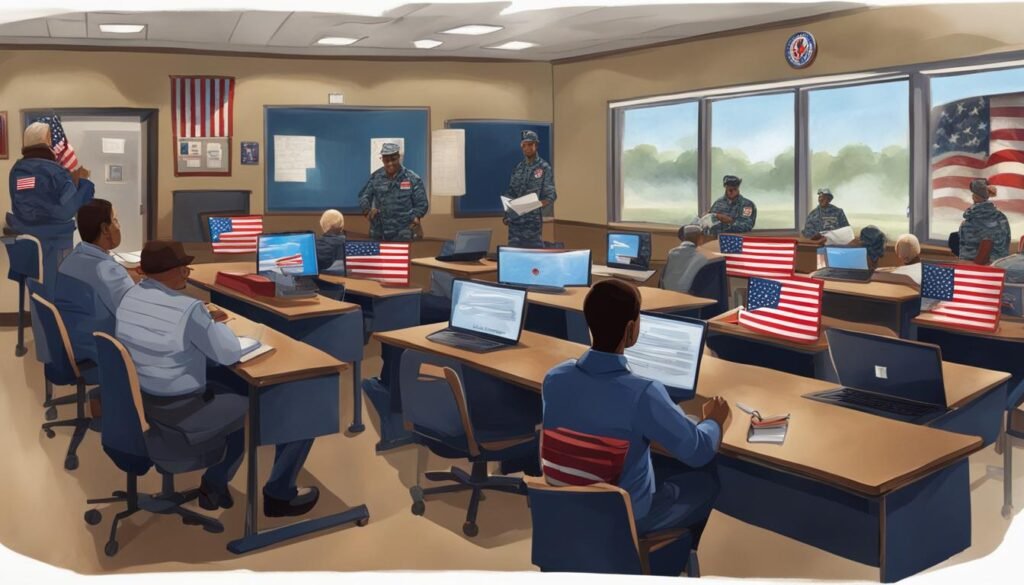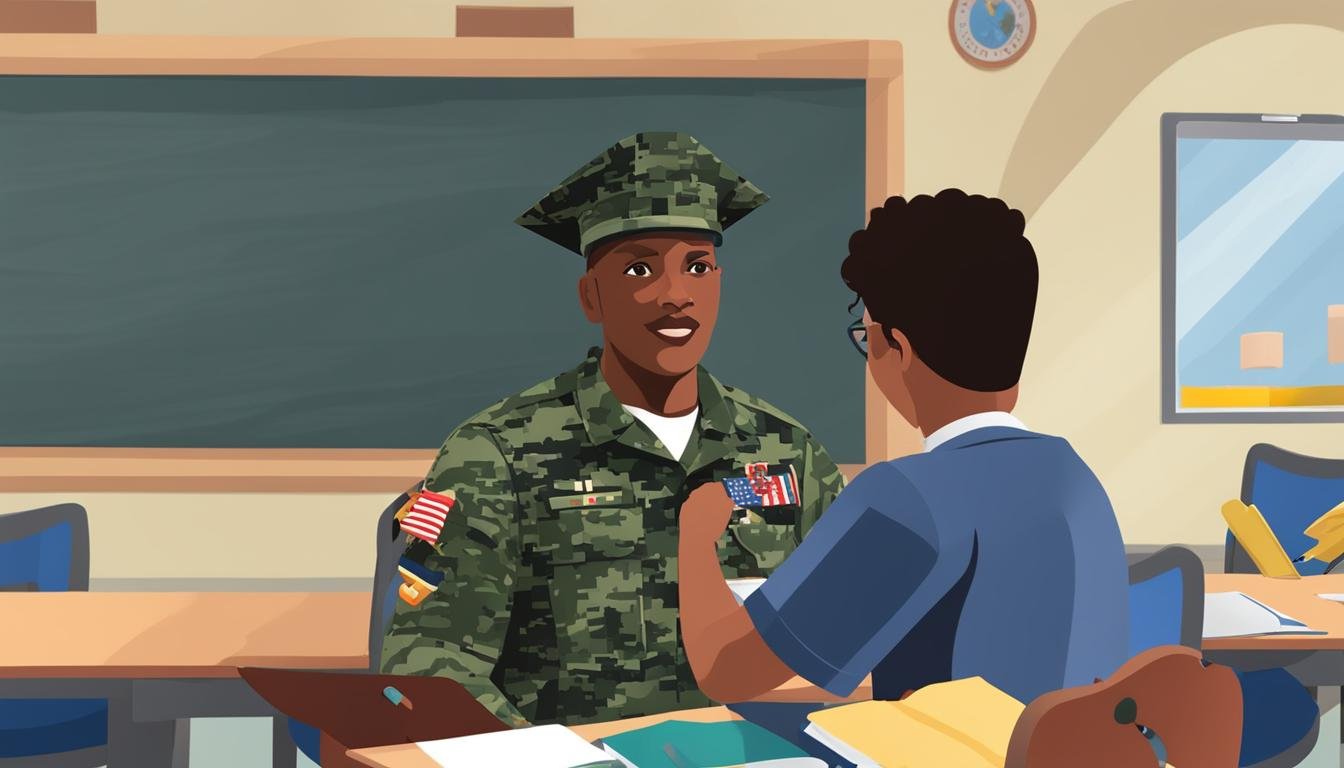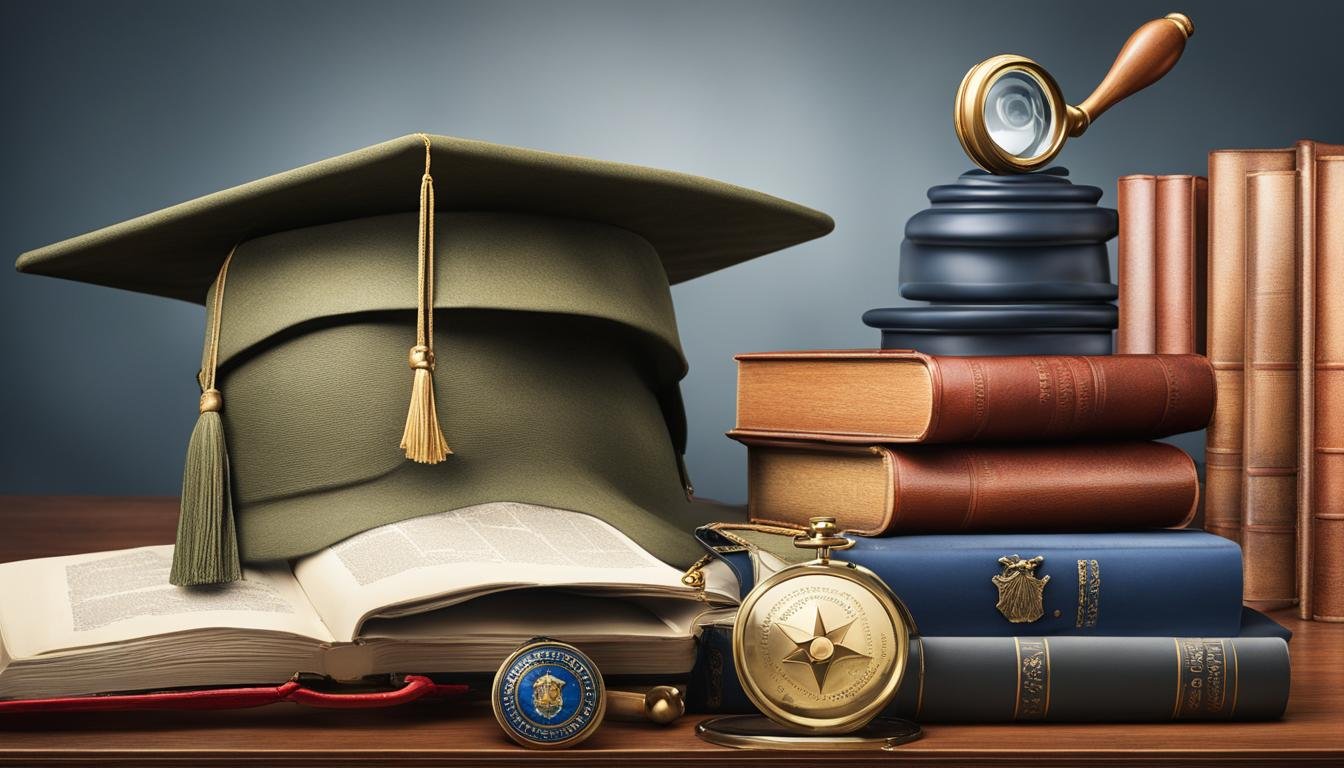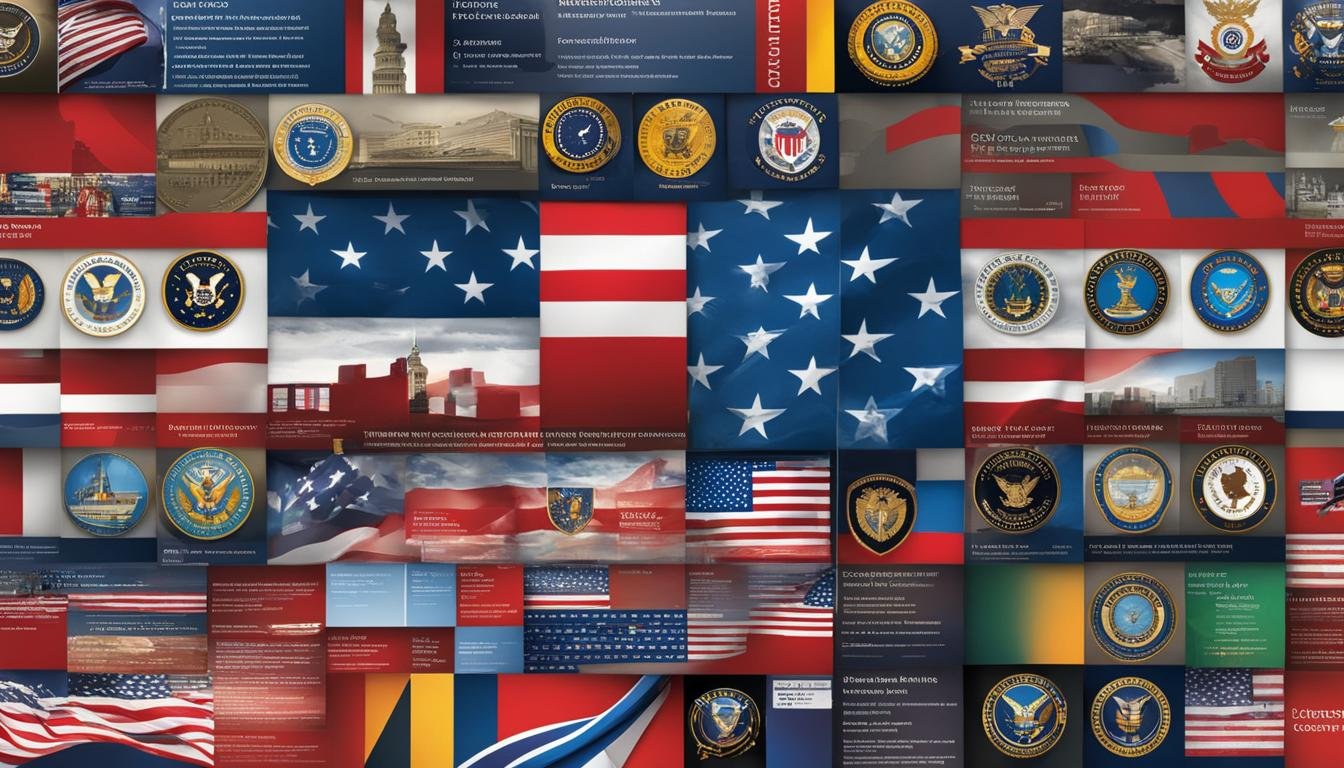Many colleges and universities offer specialized services to support veterans in their academic journey. These services include veterans education benefits, veteran support programs, and a commitment to creating a military-friendly environment on campus. The Alamo Colleges District, for example, provides comprehensive support for military families through their Military Support Services Department and Victory Center. They prioritize the needs of active duty, National Guard, and Reservists, as well as their family members. Additionally, colleges have VA Centers and offer assistance in completing certification for Veterans Education Benefits.
Key Takeaways:
- Colleges offer specialized services to support veterans in their academic journey.
- Services include veterans education benefits, veteran support programs, and a military-friendly environment on campus.
- The Alamo Colleges District provides comprehensive support for military families through their Military Support Services Department and Victory Center.
- Colleges have VA Centers and assist with certification for Veterans Education Benefits.
- Veterans can access specialized services to ensure their academic success and well-being.
Transition Assistance for Veterans

Transitioning from military service to college life can present unique challenges for veterans. To ensure a smooth adjustment, colleges provide comprehensive transition assistance programs designed specifically for veterans. These programs offer a range of support services to help veterans navigate the academic environment and successfully transition into civilian life.
One key aspect of transition assistance is career services for veterans. Colleges understand the importance of helping veterans explore career options and develop job search strategies. Dedicated career counselors provide guidance on translating military skills and experiences into valuable assets in the job market. They also assist veterans with resume writing, interview preparation, and networking opportunities, equipping them with the tools they need to pursue meaningful careers after graduation.
Moreover, colleges establish various resources on campus to cater to the needs of veteran students. Veterans centers serve as a hub for veterans to connect with peers, access resources, and seek support. These centers often provide information on veterans’ education benefits, workshops on financial literacy, and opportunities for community engagement. Additionally, colleges may have student organizations specifically for veterans, creating a sense of belonging and camaraderie within the college community.
Transitioning from military service to college life may be daunting, but with the transition assistance programs, career services, and resources offered by colleges, veterans can find the support they need to thrive academically and personally.
Veteran Resources on Campus
Colleges recognize the unique needs of veteran students and provide a wide range of resources to ensure their success. These resources include:
- Veterans centers: Dedicated spaces on campus where veterans can connect with fellow veterans, access support services, and find information on available resources.
- Counseling services: Mental health support tailored to the specific experiences and challenges that veterans may face. Counselors are trained to address issues like PTSD, transition stress, and emotional well-being.
- Academic support: Tutoring services, study skills workshops, and academic advisors who understand the unique needs of veteran students and provide tailored guidance.
- Financial aid and scholarships: Assistance in navigating the complex landscape of veterans’ education benefits, as well as access to scholarships specifically designated for veterans.
Quotes from Veterans
“The transition assistance program at my college was invaluable. They helped me navigate the enrollment process, connected me with other veterans, and provided career counseling that set me on the path to a successful civilian career.” – John, Army veteran
“The veterans center on campus was my home away from home. It gave me a sense of belonging and a support network of fellow veterans who understood my experiences.” – Jane, Marine Corps veteran
| Colleges | Transition Assistance Programs | Career Services |
|---|---|---|
| University A | Comprehensive transition workshops, peer mentoring, and academic advising | Resume writing assistance, job fairs, and networking events |
| College B | Individualized transition plans, veteran support groups, and campus resource referrals | Career exploration workshops, interview preparation, and job search assistance |
| University C | Transition seminars, counseling services, and access to academic support resources | Career assessments, internships, and employer connections |
Overall, colleges dedicate themselves to providing comprehensive transition assistance and career services for veterans. The resources and programs offered on campus ensure that veterans have the support they need to excel academically and pursue fulfilling careers upon graduation.
Support for Mental Health and Disabilities
Colleges recognize the unique challenges that veterans may face regarding mental health and disabilities. They provide specialized services and resources to support veterans in these areas, ensuring they have the necessary support to succeed academically and thrive in their personal lives. Mental health support for veterans is a top priority, with colleges offering a range of counseling services, support groups, and referrals to external mental health providers.
Colleges also have dedicated disability services departments that work closely with veterans to provide the necessary accommodations and support. These services ensure that veterans with disabilities have equal access to education and campus facilities. Accommodations may include assistive technology, note-taking assistance, extended time for exams, and accessible campus facilities. By prioritizing mental health and disability support, colleges create an inclusive environment where veterans can fully engage in their education and personal growth.
Colleges prioritize mental health and disability support for veterans to ensure their academic success and overall well-being. These services contribute to a welcoming and supportive environment for veterans, demonstrating colleges’ commitment to serving those who have served their country.
Table: College Mental Health and Disability Support Services for Veterans
| College | Mental Health Support | Disability Services |
|---|---|---|
| ABC University | Counseling services, support groups, referrals to external mental health providers | Assistive technology, note-taking assistance, accessible campus facilities |
| XYZ College | Individual counseling, group therapy, crisis intervention | Accommodations for physical and learning disabilities |
| 123 University | Peer support programs, mental health workshops, confidential counseling | Extended time for exams, accessible classrooms, adaptive technology |
How Do Colleges Provide Specialized Services for Veterans to Help with Social Integration Programs?
Colleges recognize the importance of social integration programs for veterans. They provide specialized services such as dedicated counseling, peer support groups, and tailored orientation programs. These initiatives help veterans acclimate to campus life, build connections, and overcome potential challenges in their transition to college.
Conclusion
In conclusion, colleges play a crucial role in supporting veterans with specialized services. They understand the unique challenges veterans face and strive to create a welcoming and supportive environment for them. By offering veterans education benefits, veteran support programs, and prioritizing a military-friendly campus, colleges demonstrate their commitment to serving those who have served their country.
Transitioning from military service to college life can be challenging, but colleges provide vital assistance to help veterans navigate this process. Transition assistance programs, career services, and resources on campus ensure that veterans receive the guidance and support they need to succeed academically and professionally.
Colleges also recognize the importance of mental health support and disability services for veterans. Specialized counseling services, support groups, and accommodations for disabilities are provided to ensure that veterans have access to the resources they need to thrive in their academic journey.
Overall, colleges go above and beyond to support veterans with specialized services, aiming to contribute to their academic success and overall well-being. They understand the sacrifices made by veterans and are dedicated to helping them achieve their educational and career goals. By offering these specialized services, colleges honor veterans and show their gratitude for their service to the country.



